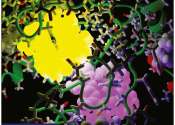Researchers uncover 'parallel universe' in tomato genetics
In a paper appearing in Science Advances, Michigan State University researchers have unraveled a surprising genetic mystery centered on sugars found in what gardeners know as "tomato tar."
Michigan State University (MSU) was established in 1855 and is located in East Lansing, Michigan. The student body exceeds 40,000 students and includes undergraduate, graduate and professional degrees. MSU's work in technology, science and engineering is ranked high in the USA. MSU's graduate school in nuclear physics was recently named the 2nd highest school of its kind in the U.S. MSU is consistently rated in the Top 100 of public universities and is particularly noted for its high retention rate for undergraduate students.
Some content from Wikipedia, licensed under CC BY-SA
Subscribe to rss feed

In a paper appearing in Science Advances, Michigan State University researchers have unraveled a surprising genetic mystery centered on sugars found in what gardeners know as "tomato tar."
Molecular & Computational biology
Apr 24, 2024
0
77

Researchers believe that understanding how electrons move within small, natural systems could power a more sustainable future for our energy grid.
Analytical Chemistry
Apr 23, 2024
0
129

For most stars, neutron stars and black holes are their final resting places. When a supergiant star runs out of fuel, it expands and then rapidly collapses on itself. This act creates a neutron star—an object denser than ...
Astronomy
Apr 19, 2024
2
703

Is it possible for nanoparticles to go through the digestive system and deliver medicine directly to the brain tissue? Researchers from Michigan State University say yes, and their latest findings are expected to benefit ...
Bio & Medicine
Apr 19, 2024
0
55

Could being well informed about politics mean you are less tolerant of differing political opinions? The answer might surprise you and be cause for pause before your next political conversation.
Social Sciences
Apr 15, 2024
0
1

Photosynthesis is a complex process, involving many pathways and puzzle pieces working together to keep the organism alive.
Plants & Animals
Apr 11, 2024
0
6

Just as many people battle seasonal colds and flu, native plants face their own viral threats. People have long known that plants can succumb to viruses just like humans. Now, a new study led by Michigan State University ...
Plants & Animals
Mar 28, 2024
0
43

A new study led by Michigan State University researcher Peter Williams sheds light on the profound influence of deep geographic isolation on the evolution of mammals. Published in Nature Communications, the research reveals ...
Evolution
Mar 28, 2024
0
204

Research has often focused on how teachers and educators can best instruct and accommodate students with disabilities. However, are the methods used to teach students with disabilities effective and inclusive for all students? ...
Education
Mar 25, 2024
0
7

Scientists from Massey University in New Zealand, the University of Mainz in Germany, Sorbonne University in France, and the Facility for Rare Isotope Beams (FRIB) discuss the limit of the periodic table and revising the ...
General Physics
Mar 19, 2024
0
55